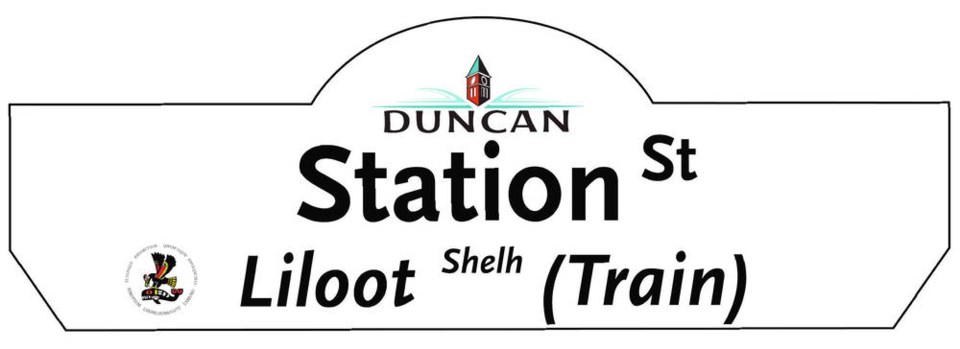Thirty new bilingual street signs in Hul’q’umi’num and English will be installed along seven downtown Duncan streets.
Duncan council members, businesses and Cowichan Tribes members, expressed hope the project will help develop closer and more respectful relations, especially in light of recent incidents of racism following reports of COVID-19 cases among First Nations members.
For many, the project signifies more that putting up new signs — it is a step toward reconciliation and understanding.
Cowichan Tribes elder Merle Seymour smiled when saying the signs would “make me walk proud.” Everyone will be learning together, he said. Seymour was among Cowichan Tribes members featured in a documentary on the project that was played for council.
The significance of using Hul’q’umi’num words was brought home when Seymour reflected on attending residential school, and what happened when the children spoke their own language. “Oh, we were in trouble. We used to get strapped. We used to get strapped on the hands, right up to here,” he said, pointing to his arm. It was hard not to speak their own language, he said, “because that’s all we knew.”
Elder Lucy Thomas said the signs “say a lot — that they want to recognize us and start working together. It just gets me excited to think about it.”
Signs are expected to be in place by March 21, said Amanda Vance, executive director of the Downtown Duncan Business Improvement Area.
The Hul’q’umi’num signage project — Nanum tu Sulhween i tu Smuneem in Hul’q’umi’num — cost $15,000, with the money coming from a provincial grant. Consultation included a youth and elders committee.
Duncan Coun. Tom Duncan said, “I can’t think of a more appropriate time to bring forward this project and to show, with regards to the things that we’ve just seen recently, that we are doing our best to work together.”
Coun. Bob Brooke agreed, saying: “This is an excellent opportunity for everyone to stand up and state that Duncan speaks as one. We are all together in the Cowichan Valley and we are brothers and sisters.”
Some of the Hul’q’umi’num names are direct or close translations of their English counterparts, while others represent items of cultural significance to Cowichan Tribes.
In addition to the street signs, the business improvement area is producing signs in Hul’q’umi’num to distribute to member businesses. They will read “Tth’ihwum ’i mi nuwilum” (please come in) and “Huy ch q’u” (thank you).
Lorna Wanosts’a7 Williams, chairwoman of the First Peoples’ Cultural Foundation and professor emeritus at the University of Victoria, said it is “huge” that the signs are coming to Duncan.
“Their commitment to take this step is really turning back the whole tide of the way that this country has been established,” she said.
It is only within the past 50 years that written forms of what had been oral Indigenous languages have been created, Williams said.
“For people to see our languages in a written form, I think, is a big thing.”
When those who don’t speak the language see its written form in signs and try to pronounce it, “it makes people realize that there’s a whole world that they don’t even know about,” she said. “And because the languages really were born on that land, if they are part of that land, then the language has to be a part of them. It’s their responsibility. If they’ve adopted that land, then they’ve adopted the voice of that land.”
What the signs will say
• Canada Avenue — Q’lhan Shelh. The street had been called Front Street in the past and Q’lhan means “ahead of.”
• Government Street — St s’hwulmuhw Shelh, for First People.
• Station Street — Liloot Shelh. Liloot means “train,” for the railway station for which Station Street is named.
• First Street — Yuwen Shelh. Yuwen means “first.”
• Second Street — Sxwuts’ts’ulii Shelh. Sxwuts’ts’ulii means “hummingbird,” an important figure in Cowichan storytelling.
• Third Street — Smuyuqw’a Shelh. Smuyuqw’a “ladybug,” another important element in Cowichan storytelling.
• Fourth Street — Thuthiqut Shelh. Thuthiqut means “forest,” which is what used to stand where the city is now.



